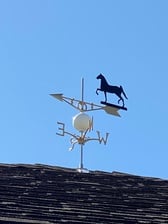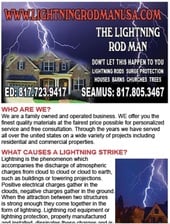
Get matched with top lightning protection installers or repairers in your area
Enter your zip and get matched with up to 3 pros
Matching on HomeAdvisor


Lightning protection installers or repairers in Penn Yan

WB Lightning Rods is a third-generation lightning protection contractor. Family Owned and operated for over 60 years. installing U.L. Listed Lightning protection systems, All Over the East coast, Midwest south east and south west regions of the U.S. Installations on Residential Homes, Estate Properties, Agricultural and Equestrian Properties. Lightning Protection for trees is also available. No job to big or small References upon Request. Contact us today for a no cost or obligation estimate. We look forward to working with you on your Lightning Protection Project. Thank you. **WE ARE NOT ELECTRICIANS** **WE ONLY INSTALL LIGHTNING PROTECTION SYSTEMS **
"Great company, they were fast, friendly, & accommodating. I would definitely use them again."
Jennifer B on October 2024
WB Lightning Rods is a third-generation lightning protection contractor. Family Owned and operated for over 60 years. installing U.L. Listed Lightning protection systems, All Over the East coast, Midwest south east and south west regions of the U.S. Installations on Residential Homes, Estate Properties, Agricultural and Equestrian Properties. Lightning Protection for trees is also available. No job to big or small References upon Request. Contact us today for a no cost or obligation estimate. We look forward to working with you on your Lightning Protection Project. Thank you. **WE ARE NOT ELECTRICIANS** **WE ONLY INSTALL LIGHTNING PROTECTION SYSTEMS **
"Great company, they were fast, friendly, & accommodating. I would definitely use them again."
Jennifer B on October 2024

The modern suburban and small town home of today has become an ideal lightning target. The home owner would do well to recognize lightning for the destructive force that it is and protect against this major life and fire hazard. Donohue's Lightning Rods is based in Missouri, near the factory where most of the residential and commercial lightning rod supplies are manufactured. Jim travels regularly to Texas, Louisiana, Arkansas, Missouri, Kansas, Montana, Wyoming, Colorado, and New York. Call today to find out when Jim will be in your area. For installations outside Missouri, Kansas, or Texas, Jim waits until there are a few customers lined up, thus being able to provide the same quality services at affordable prices. **WE DO NOT DO ELECTRICAL SERVICES.** (ONLY LIGHTNING RODS)
"The job was beautifully and professionally done. I have a zero scape yard and the gentleman was concerned about disturbing the gravel when putting the rod into the ground. WOW!!!!"
undefined on June 2025
The modern suburban and small town home of today has become an ideal lightning target. The home owner would do well to recognize lightning for the destructive force that it is and protect against this major life and fire hazard. Donohue's Lightning Rods is based in Missouri, near the factory where most of the residential and commercial lightning rod supplies are manufactured. Jim travels regularly to Texas, Louisiana, Arkansas, Missouri, Kansas, Montana, Wyoming, Colorado, and New York. Call today to find out when Jim will be in your area. For installations outside Missouri, Kansas, or Texas, Jim waits until there are a few customers lined up, thus being able to provide the same quality services at affordable prices. **WE DO NOT DO ELECTRICAL SERVICES.** (ONLY LIGHTNING RODS)
"The job was beautifully and professionally done. I have a zero scape yard and the gentleman was concerned about disturbing the gravel when putting the rod into the ground. WOW!!!!"
undefined on June 2025
FAQs for lightning protection install or repair projects in Penn Yan, NY
The main drawbacks of lightning protection systems are upkeep and appearance. The system needs routine cleaning and professional inspections; skip them, and the rods might fail when you need them most. Over time, those visits add a little extra cost and effort. Some homeowners also dislike the look of metal rods or cables along the roofline. If aesthetics worry you, ask your installer about lower-profile hardware or ways to blend the components into your roof.
No, the copper in lightning rods does not attract lightning. Instead, lightning targets the highest nearby point, not the metal itself. Copper is simply a superior conductor, which is why pros use it. When a bolt hits the rod, the copper safely channels the charge through the grounding cable and into the earth, sparing your home. Choosing copper doesn’t draw more strikes—it just handles them better.
Rod count depends on your home’s size and the system you choose. A 3,000-square-foot house needs six to eight copper or aluminum rods for full coverage, while a single ESE air terminal often protects the same area on its own. A UL-certified pro can measure your roof, spot potential strike points, and recommend the right number for complete peace of mind.
Always hire an Underwriters Laboratories-certified installer. A UL-certified pro follows the Lightning Protection Institute’s strict rules, mounts each rod securely, and uses only UL-listed parts. Professional installation protects you from falls, wiring mistakes, and code violations, and it ensures the system works exactly as designed when the next storm rolls through.





- Circuit Breaker / Electrical Panel Installation
- Doorbell / Security Camera Installation
- Electrical - Multiple Projects
- Electrical Multi-Item Installation
- Doorbell / Security Camera Repair
- Electrical Multi-Item Repair
- Electrical Item Repair
- Power Outlet Replacement
- Electric Vehicle Charger Installation
- Ceiling / Bath Fan Replacement
- Light Fixture Installation
- Smoke Detector Repair
- Switch Repair
- Doorbell / Security Camera Replacement
- Electrical Wiring or Panel Upgrade
- Power Outlet Repair
- Smoke Detector Replacement
- Ceiling / Bath Fan Installation
- Electrical Item Installation
- Electrical Switches, Outlets & Fixtures - Install or Repair
- Switch Installation
- Light Fixture Replacement
- Electrical for Home Addition or Remodel - Install
- Electric Vehicle Charger Repair
- Ceiling / Bath Fan Repair
- Light Fixture - Install
- Circuit Breaker / Electrical Panel Repair
- Power Outlet Installation
- Light Fixture Repair
- Switch Replacement
- Birmingham
- Phoenix
- Tucson
- Fresno
- Long Beach
- Los Angeles
- Modesto
- Sacramento
- San Diego
- San Francisco
- San Jose
- Denver
- Hartford
- Washington DC
- Fort Lauderdale
- Jacksonville
- Miami
- Orlando
- Tampa
- Atlanta
- Chicago
- Indianapolis
- Louisville
- New Orleans
- Baltimore
- Boston
- Detroit
- Grand Rapids
- Minneapolis
- Saint Paul
- Kansas City
- Saint Louis
- Las Vegas
- Albany
- New York
- Asheville
- Charlotte
- Greensboro
- Raleigh
- Winston Salem
- Cincinnati
- Cleveland
- Columbus
- Oklahoma City
- Portland
- Harrisburg
- Philadelphia
- Pittsburgh
- Providence
- Memphis
- Nashville
- Austin
- Dallas
- El Paso
- Fort Worth
- Houston
- San Antonio
- Salt Lake City
- Norfolk
- Richmond
- Virginia Beach
- Seattle
- Madison
- Milwaukee



